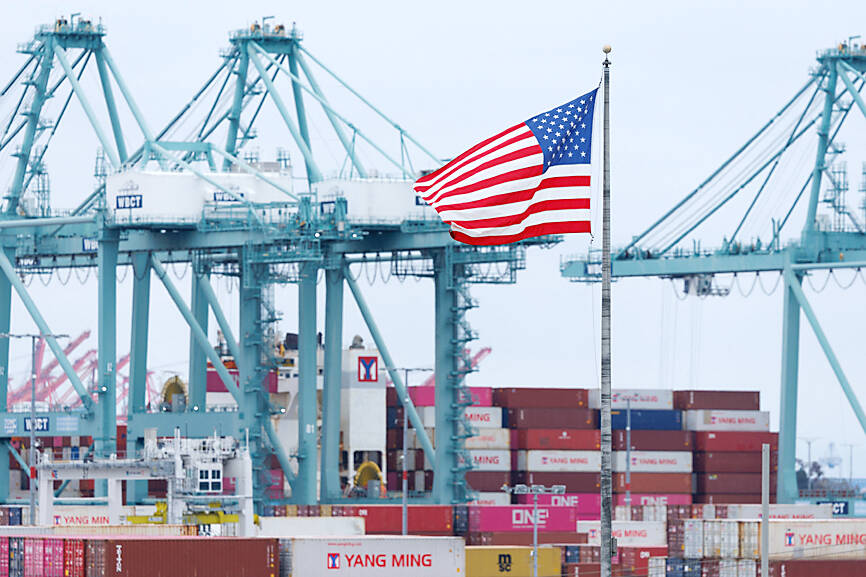US President Donald Trump’s effort to target China through its trading partners across global supply chains threatens to erode the country’s growth and most of its exports to the US, according to Bloomberg Economics.
China has increasingly relied on third countries for the manufacturing of final products or components, a trend that accelerated following Trump’s first trade war and his imposition of higher restrictions on the world’s second-largest economy.
China’s share of total value-added manufacturing of goods destined for the US through countries including Vietnam and Mexico surged to 22 percent in 2023 from 14 percent in 2017, according to Bloomberg Economics.

Photo: Reuters
If Trump is successful in targeting transshipments via higher levies or supply chain requirements, it would threaten 70 percent of China’s exports to the US and more than 2.1 percent of the Asian country’s GDP, the analysts found.
There is a risk of additional economic damage if the restrictions weigh on countries’ desire to do business with China, they said.
“Trade flows via third countries are substantial and have helped cushion the blow from existing US tariffs,” Bloomberg Economics analysts Chang Shu (舒暢), Rana Sajedi and David Qu (曲天石) wrote in a research note yesterday. “Tighter controls on these shipments would increase the damage from the trade war and could erode growth opportunities in the long term.”
The US is increasingly adding pressure on China through other countries.
In a slew of letters to countries announcing levies by Friday next week unless bilateral trade deals are agreed, the Trump administration threatened even higher tariffs for goods found to be transshipped. While not providing further details, this could allow the White House to target a broader range of China’s exports to the US.
The largest countries that China relies on for shipping goods to the US include Mexico and Vietnam, with the EU also a key hub.
China’s role in supplying the world through third parties could shape US agreements with trading partners.
There are signs of this already taking place: The US trade deal with the UK includes requirements on supply-chain security and ownership in sensitive sectors.
At the same time, Shu and economists said that “uncertainty clouds how rigorously the US will be able to enforce transshipment restrictions. US definitions of localized goods remain vague, and details on verification are lacking.”

RUN IT BACK: A succesful first project working with hyperscalers to design chips encouraged MediaTek to start a second project, aiming to hit stride in 2028 MediaTek Inc (聯發科), the world’s biggest smartphone chip supplier, yesterday said it is engaging a second hyperscaler to help design artificial intelligence (AI) accelerators used in data centers following a similar project expected to generate revenue streams soon. The first AI accelerator project is to bring in US$1 billion revenue next year and several billion US dollars more in 2027, MediaTek chief executive officer Rick Tsai (蔡力行) told a virtual investor conference yesterday. The second AI accelerator project is expected to contribute to revenue beginning in 2028, Tsai said. MediaTek yesterday raised its revenue forecast for the global AI accelerator used

Taiwan Semiconductor Manufacturing Co (TSMC, 台積電) has secured three construction permits for its plan to build a state-of-the-art A14 wafer fab in Taichung, and is likely to start construction soon, the Central Taiwan Science Park Bureau said yesterday. Speaking with CNA, Wang Chun-chieh (王俊傑), deputy director general of the science park bureau, said the world’s largest contract chipmaker has received three construction permits — one to build a fab to roll out sophisticated chips, another to build a central utility plant to provide water and electricity for the facility and the other to build three office buildings. With the three permits, TSMC

TEMPORARY TRUCE: China has made concessions to ease rare earth trade controls, among others, while Washington holds fire on a 100% tariff on all Chinese goods China is effectively suspending implementation of additional export controls on rare earth metals and terminating investigations targeting US companies in the semiconductor supply chain, the White House announced. The White House on Saturday issued a fact sheet outlining some details of the trade pact agreed to earlier in the week by US President Donald Trump and Chinese President Xi Jinping (習近平) that aimed to ease tensions between the world’s two largest economies. Under the deal, China is to issue general licenses valid for exports of rare earths, gallium, germanium, antimony and graphite “for the benefit of US end users and their suppliers

Dutch chipmaker Nexperia BV’s China unit yesterday said that it had established sufficient inventories of finished goods and works-in-progress, and that its supply chain remained secure and stable after its parent halted wafer supplies. The Dutch company suspended supplies of wafers to its Chinese assembly plant a week ago, calling it “a direct consequence of the local management’s recent failure to comply with the agreed contractual payment terms,” Reuters reported on Friday last week. Its China unit called Nexperia’s suspension “unilateral” and “extremely irresponsible,” adding that the Dutch parent’s claim about contractual payment was “misleading and highly deceptive,” according to a statement